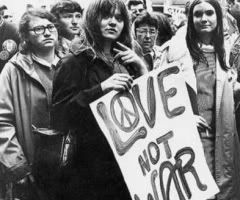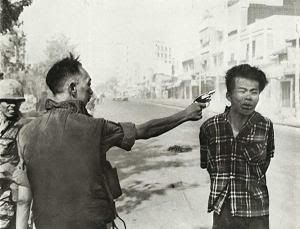The hippie generation was too eccentric for many average Americans. Their lifestyle in general was a joke to the conventional citizens. Though their dress, hair, drug use, and radical beliefs shocked many people, the group’s deep concern about the Vietnam War turned out to be a huge positive impact on America and the world.
Throughout my research on hippies I have learned how these nonconformists walked to their own beat. Hippies did not care about money, or materialistic things, they lived their lives on their own terms, and spoke out with protests and sit-ins on topics they truly cared about. Today, mainly my generation, I see kids just following the “norm.” We don’t protest on issues we’d like to change. Yet, just a few decades ago young people were fighting for change in our country- the Vietnam War fed their fire to fight for what they believed in.

I find it so interesting how hippies practically rejected American values and made their own lifestyles. However, aside from their rebellious attitudes, these people had a strong passion against the war and made a lot of effort to stop it. For some reason this amazes me. People constantly have a disapproving outlook on hippies; yes they did drugs, had premarital sex, and dressed funky, but they cared about other human beings lives and would go to measures of putting together protests of thousands of people just to bring the soldiers home.
Politics played a huge role in their lives and when the topic rose, hippies would put their lifestyles away to voice their beliefs to the world. The counterculture did this in many ways including musical shows, pacifist folk songs, and through peaceful sit-ins. But none of their actions were seen and heard more than from their rallies and protests. Hippies opposed the Vietnam War for a variety of reasons: opposition to the draft, moral, ethical and illegal reasons, and the fear of “imperial” U.S. intervention. The media's portrayal of the situation in South East Asia also was very influential.
One of the biggest “turn-off’s” to the Vietnam War involvement was the draft. The draft is a system of conscription which, according to hippies, threatened lower and middle class registrants. This belief was the driving force behind many protests after 1965. The military draft mobilized early baby boomers who were most at risk of dieing in Vietnam, but grew to include a varied cross-section of Americans. The prevailing sentiment that the draft was unfairly administered inflamed blue-collar and African-American opposition to the Vietnam War and more specifically to the military draft, which it exemplified.
Hippies’ opposition to the war arose during a time of unprecedented student activism which followed the free speech and civil rights movements. The growing opposition to the Vietnam War was partly attributed to greater access to uncensored information presented by the extensive television coverage on the ground in Vietnam.
Hippies opposing the draft, also characterized as anti-war protesters, made moral arguments against the United States' involvement in Vietnam. This ideology was especially popular among college-based protesters. Hippies and students both were more likely to accuse the United States of having imperialistic goals in Vietnam than the general public, and were also more likely to criticize the war as immoral as many civilians were killed during the war by our solders as popularized by the media. Photographic evidence illustrated by the main-stream media proved there were civilian deaths in Vietnam, for example, the picture of General Nguyen Ngoc Loan, of the South Vietnam military, holding a pistol to the head of an alleged terrorist during the Tet Offensive. This image, seen on the cover of Life magazine, whether or not true, illustrated the ways in which the Vietnam War was fought and resulted in public outcries that surrounded the mass killings of civilians occurring in Vietnam.

Hippies as well as the general American public were highly influenced by battle footage that was dispensed to the public. These images eliminated any mythic reality surrounding the glory of war as U.S. solders and Vietnamese civilian casualties were shown on the nightly news. With no clear sign of victory in Vietnam, these horrific media images of casualties helped to stimulate opposition to the war.
This opposition against the war also was centered on the perceived illegality of the war itself. Intervention in Vietnam was justified by American leaders, using the domino theory and the threat of Communism as their motives. Many hippies believed that the Communist threat was used as a scapegoat to hide imperialistic intentions, and that the American intervention in South Vietnam interfered with the "self-determination" of the country. In other words, the conflict in Vietnam was a civil war that ought to have determined the fate of the county and, therefore, America was not justified in interfering.

0 comments:
Post a Comment